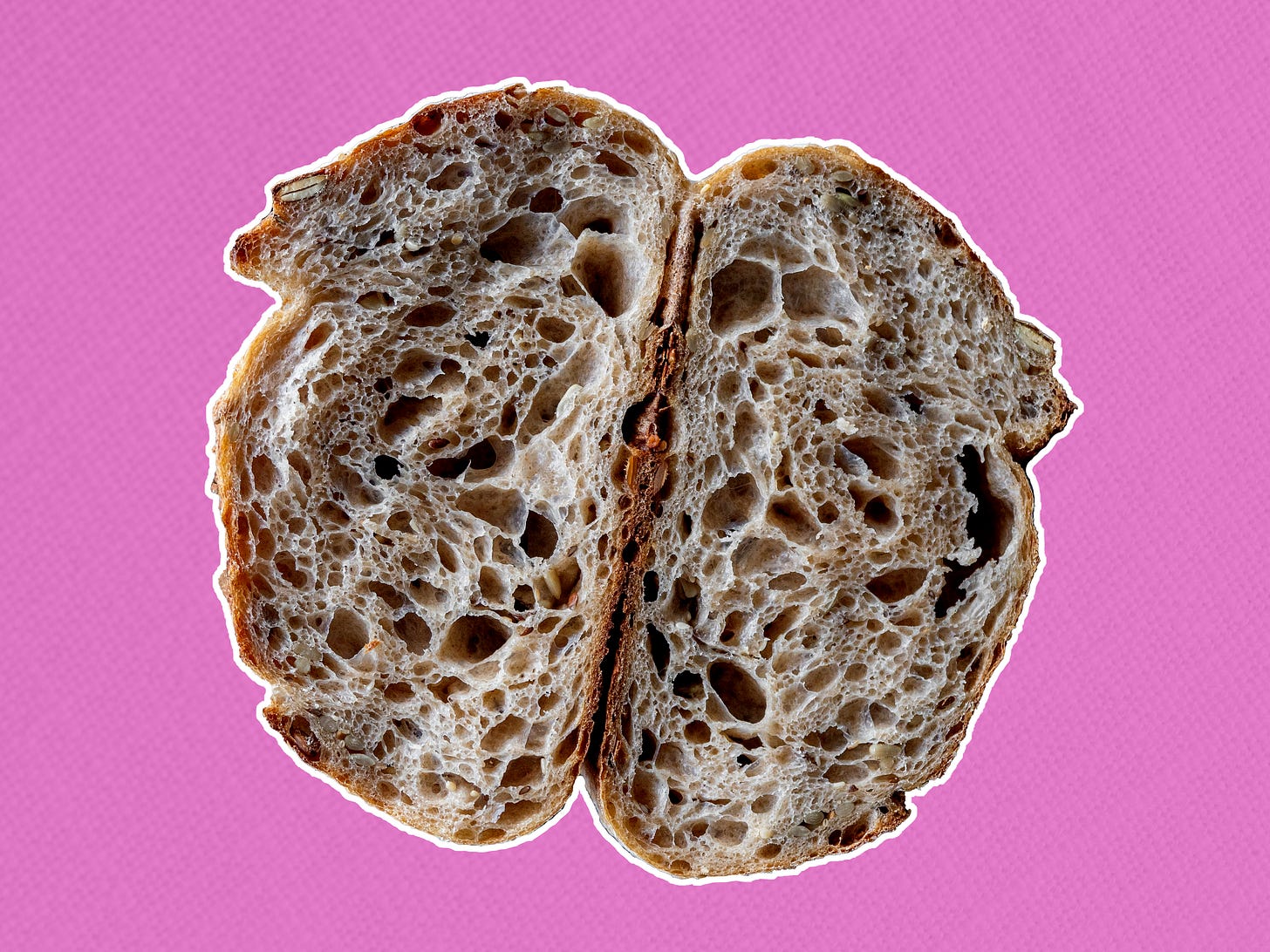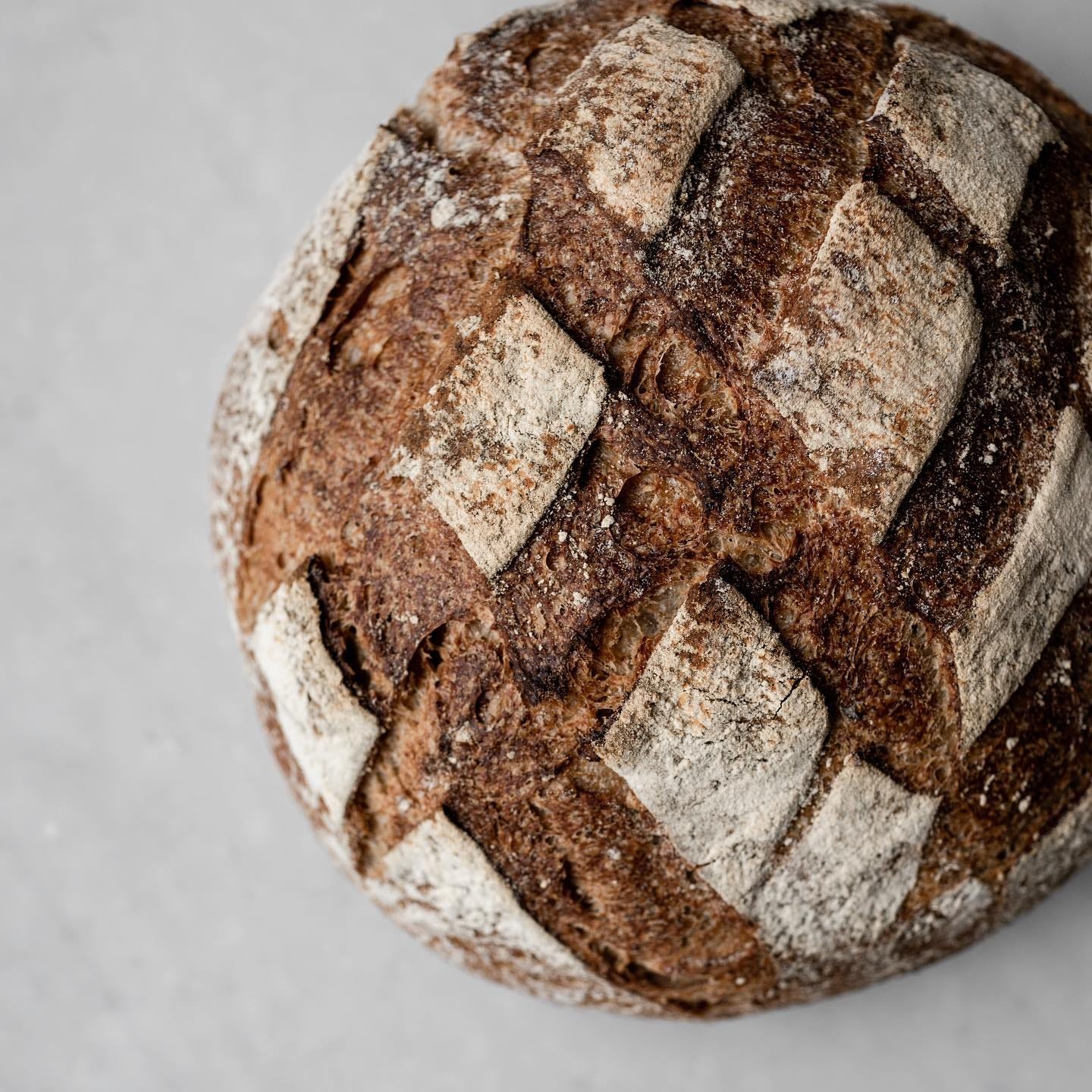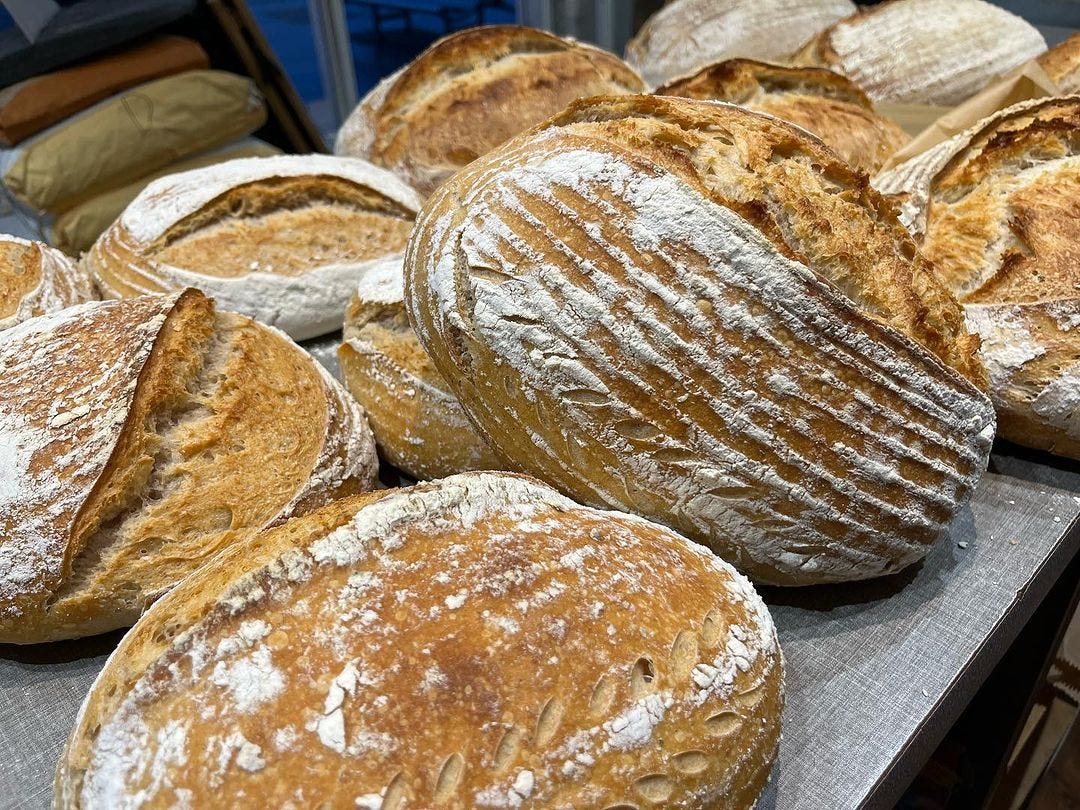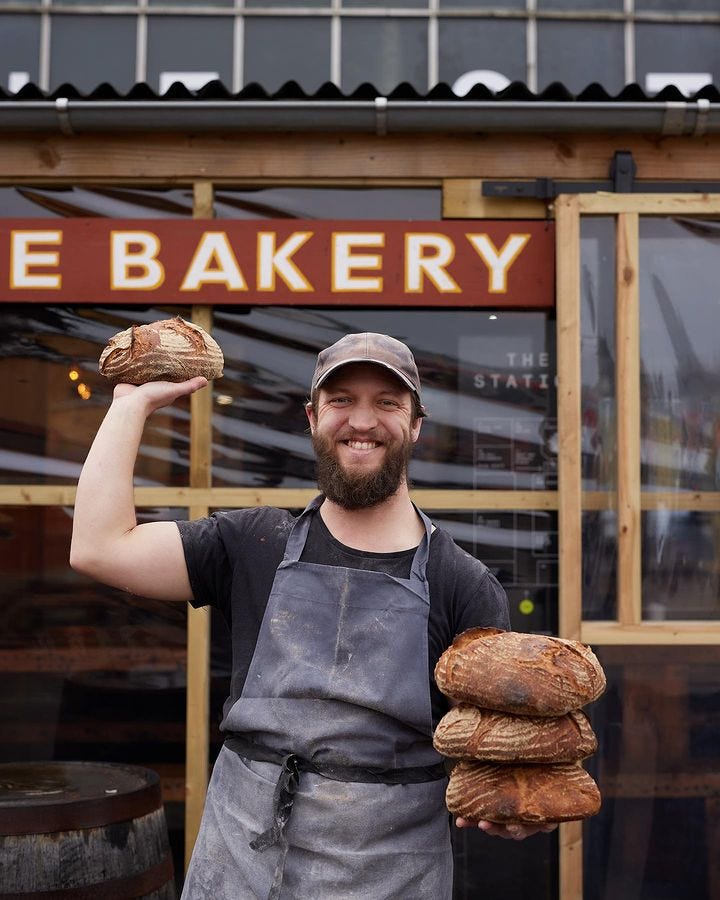How (and where) to find proper sourdough bread in Somerset
Sometimes the difference between real bread and ‘real’ bread isn't so obvious
In about 4000 BC, someone either had the bright idea, or made the world’s best mistake, of leaving a mixture of flour and water to ferment over a certain amount of time, before deciding to shove the resultant soft, pillowy mass into a hot oven for 45 minutes.1
6,000 years later, and the basic recipe for making leavened bread is still very much in use. Only so too is a variety of time-saving and cost-cutting methods, each one in some way compromising on the texture, flavour, nutrition, and gut-friendliness that made bread such an essential, political, and civilisational foodstuff in the first place.
To give you an example: in one corner, we have a £1.39 sliced Hovis – white as white can be and as soft as a washing up sponge – only possible with what the industry refers to as the Chorleywood process: a cocktail of chemicals and processing aids designed to create a packaged loaf in three to four hours, but as a result is more likely to trigger symptoms of IBS and is suspected to be a significant contributor to the rise in cases of coeliac disease.
In the other corner: a £4 sourdough loaf from your local bakery made from three ingredients – and over the course of about three days – sold the same day it’s baked and reliant on naturally-occuring cultures to give it its lift and volume. Though both we’d call ‘bread’, it’s fair to say they aren’t really in the same category.
While these distinctions are fairly easy to make, it’s the ones that aren’t that are causing a bit of hoo-ha among campaign groups and to some degree the general public. And why shouldn’t it, when supermarket shoppers are consistently and deliberately misled about bread claiming to be the real deal but is anything but?
And so poses the question – whether you’re in the supermarket, farm shop, a deli, or a bakery itself, is there any watertight way in telling the difference between a genuine sourdough loaf and (as coined by the Real Bread campaign) ‘sourfaux’?
“No,” says Chris Young, who’s coordinated the Real Bread Campaign since 2009. Other than making it yourself, “the only way to tell for sure whether or not a product is genuine sourdough bread is to read the label,” he tells The Wallfish Journal. “If the ingredients list includes the word ‘yeast’, it’s not genuine sourdough bread.”
Here’s the catch – while that may be the best method of telling real from fake, it’s not always the one that’s available, especially when the bread isn’t sold packaged. One alternative would be to look for The Sourdough Loaf Mark – a label created by the Real Bread Campaign that helps bakeries give an ‘at-a-glance’ assurance their bread is what it says it is. Should that not be evident at wherever you’re shopping, you could ask a member of staff if their sourdough loaves contain anything more than water, salt, and flour. If they can’t answer, then that may well be as good an indicator as any.
“It’s a pain,” Chris says, referring to the general rigmarole of research and diligence shoppers have to undertake to find out if the bread they buy is genuine. “Which is why we lobby for mandatory ingredient listing as part of our Honest Crust Act proposals, and urge all bakers and retailers to do so voluntarily in the meantime.”
On that note, I couldn’t find a list of places in Somerset from which you can buy Real Bread (not, even, from Real Bread Campaign’s map of trusted bakers and other venues), or more specifically real sourdough.
So, I made one.
Just to reiterate, none of this is to say sourdough is the only ‘real bread’. The Real Bread Campaign states that, because baker’s yeast isn’t inherently bad, it’s more the additives you’ve got to look out for. So, to recap: Only a small percentage of bread is Real Bread, and only a small percentage of Real Bread is sourdough. Got it?
Over the last few weeks, paid subscribers have received in their inboxes: local food gossip; a piece on how to eat out on a budget in Somerset; and an article detailing a visit to Somerset’s newest brewery.
Where to find real actual proper sourdough in Somerset
At the Chapel
White, wholemeal, and five-seed sourdough loaves out of a former 18th century congregational chapel in Bruton. Alternatively, At the Chapel’s loaves can be found in a variety of other places around Somerset, including a pop-up bakery at The White Heart in Somerton every Tuesday.
Bertinet Bakery
Over the years, Richard Bertinet and his Bath-based bakery have made a bit of a name for themselves on telly and across the country – not just Somerset. That has meant Bertinet bread is now in hundreds of shops, from Stirling down to Truro. Though this includes numerous Waitrose outlets, it still gets Real Bread’s seal of approval, proving that supermarkets can on the rare occasion sell unadulterated sourdough.
Dough
Dough’s shop lights up Taunton’s Bath Place, and I don’t mean just with its candy-pink exterior – when not making Bakewell slices or rhubarb and custard cruffins, they’re shaping real sourdough bread with water, salt, Shipton Mill flour, and a little patience.
Field Bakery
Field Bakery is one culmination of the regenerative farming practices happening at Gothelney Farm outside Bridgwater. Not only does the bakery make and sell genuine sourdough at the farm, it’s a genuine beacon within the UK’s seed sovereignty movement (that is, growing, saving and exchanging seed outside the boundaries of corporate control), while largely being at the heart of the South West Grain Network of growers, farmers, millers, brewers, bakers, and so on.
Landrace
Similar to Field Bakery, Landrace takes the wider ethos of sourdough bread one step further, and by involving themselves in as much of the process as possible – from contracting out the growing of diverse (therefore resilient) population grain to milling the wheat to baking the loaves – within a system kinder to soils and the environment. You can get their bread from their shop on the farm at Westcombe (where they have their mill), or their bakery on Walcot Street in Bath.
Lievito Bakery
Baker Phil Nicodemi has a clear affection for bread-based items from his native Italy (see for example the maritozzi), but also a general appreciation for simple, good bread. Based in Lovington just outside Castle Cary, the bakery has no public frontage, but you can find Lievito’s sourdough bread at their sibling cafe-restaurant, Lovington Bakery in Wincanton.
Little Bakery
Langport’s Little Bakery is owned and run by mother and daughter Mel and Sarah – both of whom very au fait with the notion of better bread needing better ingredients (in this case, Shipton Mill’s organic flour). Their shop, on the corner where Parrett Close meets Bow Street, is open every day of the week.
Longstraw
This small bakery in Wiveliscombe strongly believes in the regenerative principles so necessary to help fix the food system. In order to act on and support those principles, they tap into the South West Grain Network and the organic, non-commodity grains circulating within it. Longstraw’s bakery is open on Fridays, while you can also find their loaves at the likes of Ruxstons in Wellington.
Rye Bakery
Based out of their bakery on Frome station’s concourse, and their restored church cafe in the town proper, Rye’s sourdough loaves come in the form of Heritage (referring to the population grain in its composition), Westcountry (using a mixture of population and organic stoneground wholemeal flour from the region), and White (like the Westcountry loaf, but with a higher proportion of Shipton Mill’s white flour). Again, using heritage and population grains grown and milled – often by their own machine – as part of the South West Grain Network.
Somerset Bakery & Deli
If you regularly visit the markets in Street and Langport, chances are you already know about Somerset Bakery, who bake out of a dairy farm in Stoke Saint Gregory. Their sourdough is powered by a 200-year-old starter culture. Other ingredients? Simply – as it should be – flour, water, and salt.
Strictly Sourdough
True to name, Tabitha (with the help of ‘Gog’, her Shipton Mill-fed starter culture), makes bona fide sourdough loaves out of her microbakery in Glastonbury. Find her loaves in local shops and cafes such as Middlewick Farm Shop and Earthfare.
The Kind Kitchen
Naturally-leavened bread baked in Minehead, from Gothelney Farm and Shipton Mill flour. The Kind Kitchen’s shop and cafe is on Friday Street, while they’re also regular attendees of the farmers market in town and the Saturday market in Wiveliscombe.
Read next:
Don’t quote me on this










Pretty sure the Barley Sugar Bakery in Crewkerne would qualify but you'd have to check to be 100% sure I guess. Very fine sourdough bread and other baked goods either way!